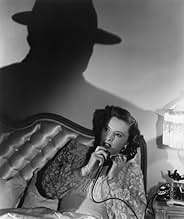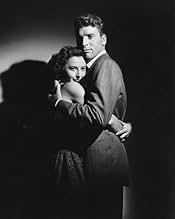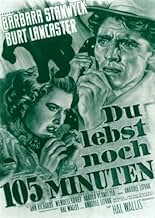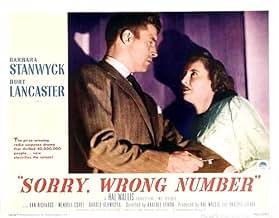VALUTAZIONE IMDb
7,3/10
13.477
LA TUA VALUTAZIONE
Mentre è al telefono, una donna invalida ascolta quello che lei pensa sia un complotto di omicidio e cerca di prevenirlo.Mentre è al telefono, una donna invalida ascolta quello che lei pensa sia un complotto di omicidio e cerca di prevenirlo.Mentre è al telefono, una donna invalida ascolta quello che lei pensa sia un complotto di omicidio e cerca di prevenirlo.
- Candidato a 1 Oscar
- 3 vittorie e 3 candidature totali
Bill Cartledge
- Page Boy
- (non citato nei titoli originali)
Cliff Clark
- Police Sergeant Duffy
- (non citato nei titoli originali)
Joyce Compton
- Cotterell's Blonde Girlfriend
- (non citato nei titoli originali)
Ashley Cowan
- Clam Digger
- (non citato nei titoli originali)
Yola d'Avril
- French Maid
- (non citato nei titoli originali)
Suzanne Dalbert
- Cigarette Girl
- (non citato nei titoli originali)
Recensioni in evidenza
A woman confined to a bed overhears a murder plot on a crossed telephone line and tries to alert the police. The plot structure is quite convoluted, with most of the story told in flashbacks. In fact there are flashbacks within flashbacks, making it somewhat hard to follow. The audience is supposed to feel sympathy for Stanwyck, but the character is too self-centered and whiny for that to happen. Given her character's propensity for histrionics, the actress manages to keep her performance somewhat controlled; Lancaster is fine as her trophy husband. Litvak creates a good film noir atmosphere, although at times his camera roams aimlessly, becoming a distraction.
Heck of a thriller, though the narrative is difficult to piece together at times. Stanwyck gets to run through a gamut of hysterical emotions as the intended victim. Her Leona is not particularly likable as the rich man's daughter who gets her way by bullying people around her. So there's some rough justice in her predicament—alone, disabled and dependent on the phone while a killer seemingly stalks her. Even the independent working-man, a studly Henry (Lancaster), is bullied into taking up with her. Of course, it doesn't hurt that she's got scads of money to assist her schemes. Incidentally, catch how Henry's several capitulations to others (Leona, Morano) are marked by allowing them to light his cigarette. Nice touch.
The idea of only gradually revealing why Leona is being set up for murder is a good one. It adds to the suspense—not just a 'when' but also a 'why'. The trouble is the disclosure is only revealed in pieces over the phone using flashbacks, and these are hard to piece together over a stretch of time. But enough comes through that we get the idea. There's some great noir photography from Sol Polito that really adds to the tense atmosphere. Anyhow, it's a great premise that also played well over the radio that I recall as a kid. It's also a subtle irony that one could end up being so alone in the middle of a great city. Poor Leona, maybe if she had been a little nicer and less bossy over the phone, she might have made the human connection she needed.
The idea of only gradually revealing why Leona is being set up for murder is a good one. It adds to the suspense—not just a 'when' but also a 'why'. The trouble is the disclosure is only revealed in pieces over the phone using flashbacks, and these are hard to piece together over a stretch of time. But enough comes through that we get the idea. There's some great noir photography from Sol Polito that really adds to the tense atmosphere. Anyhow, it's a great premise that also played well over the radio that I recall as a kid. It's also a subtle irony that one could end up being so alone in the middle of a great city. Poor Leona, maybe if she had been a little nicer and less bossy over the phone, she might have made the human connection she needed.
Alfred Hitchcock himself praised this movie that was for him one of Barbara Stanwyck's most extraordinary parts.Besides,he did include Lucille Fletcher's short novel in his anthology "stories not for the nervous"(sic)
The story of this woman in her bed,who has heard on the phone someone is in danger,and who little by little discovers the horrible truth,is a first-class screen play which requires the viewer's attention,,or else he may lose the vital lead.The first people who enjoyed it had no pictures,since it was originally a radio broadcast,so they had to show a lot of imagination.The movie remains talky but the numerous flashbacks give it substance.The phone,is along with Stanwyck ,the star of Litvak's work;Burt Lancaster,a great actor though,only serves as a foil to both of them.50% of the dialogue consists of phone calls,that's what makes this thriller unique.
A strong connection with Hitchcock's work is the father's part(Ed Bigley).He is some equivalent of the Mother in many movies of his.The stuffed animals in his desirable mansion are a symbol of his daughter's lifelessness.(Coincidence?There will be such hunting trophies (and more) in his "psycho" twelve years later,and the topic is present in "the man who knew too much"(2nd version))
If you are fond of suspense,this is an unqualified must!
The story of this woman in her bed,who has heard on the phone someone is in danger,and who little by little discovers the horrible truth,is a first-class screen play which requires the viewer's attention,,or else he may lose the vital lead.The first people who enjoyed it had no pictures,since it was originally a radio broadcast,so they had to show a lot of imagination.The movie remains talky but the numerous flashbacks give it substance.The phone,is along with Stanwyck ,the star of Litvak's work;Burt Lancaster,a great actor though,only serves as a foil to both of them.50% of the dialogue consists of phone calls,that's what makes this thriller unique.
A strong connection with Hitchcock's work is the father's part(Ed Bigley).He is some equivalent of the Mother in many movies of his.The stuffed animals in his desirable mansion are a symbol of his daughter's lifelessness.(Coincidence?There will be such hunting trophies (and more) in his "psycho" twelve years later,and the topic is present in "the man who knew too much"(2nd version))
If you are fond of suspense,this is an unqualified must!
Sorry, Wrong Number (1948)
You can tell this thriller was once a radio play--it is mostly talk, and often over the telephone. But what drama can be built on a string of conversations around the office, in cars in the rain, out on a lonely beach on Staten Island, and on the telephone, often filled with mystery and doom.\
Not that it's not a visual movie, either. There is a big gloomy house, and lots of dark city streets. Shadows and moving camera and close-ups of faces and telephones, all keep you glued and increasingly worried. By the end, the really jarring, memorable end, you are ready for what you can never be ready for.
Beware, the plot is confusing. Even seeing it twice I had to pay attention to who was who, and what turn of events had just taken place. Part of the reason is there is a bewildering use of flashbacks, even flashbacks within flashbacks, told by all kinds of different characters. The plot is laid out methodically, but take notes as you go, or at least take note. The initial overheard phone call is key to it all, and it gets reinforced later somewhat, but pay heed there.
And the person on the phone? A sharp, bitter, convincing Barbara Stanwyck, who really knows how to be steely and vulnerable at the same time. Burt Lancaster is more solid and stolid, and maybe less persuasive overall, but he carries a more practical part of the story. It keeps coming back to Stanwyck in bed, and the telephone which is her contact with the facts, as they swirl and finally descend.
Director Anatole Litvak has some less known but thrilling dark dramas to look for, including Snake Pit. But this is his most sensational winner, partly for Stanwyck, and partly for the last five minutes, which is as good as drama gets.
You can tell this thriller was once a radio play--it is mostly talk, and often over the telephone. But what drama can be built on a string of conversations around the office, in cars in the rain, out on a lonely beach on Staten Island, and on the telephone, often filled with mystery and doom.\
Not that it's not a visual movie, either. There is a big gloomy house, and lots of dark city streets. Shadows and moving camera and close-ups of faces and telephones, all keep you glued and increasingly worried. By the end, the really jarring, memorable end, you are ready for what you can never be ready for.
Beware, the plot is confusing. Even seeing it twice I had to pay attention to who was who, and what turn of events had just taken place. Part of the reason is there is a bewildering use of flashbacks, even flashbacks within flashbacks, told by all kinds of different characters. The plot is laid out methodically, but take notes as you go, or at least take note. The initial overheard phone call is key to it all, and it gets reinforced later somewhat, but pay heed there.
And the person on the phone? A sharp, bitter, convincing Barbara Stanwyck, who really knows how to be steely and vulnerable at the same time. Burt Lancaster is more solid and stolid, and maybe less persuasive overall, but he carries a more practical part of the story. It keeps coming back to Stanwyck in bed, and the telephone which is her contact with the facts, as they swirl and finally descend.
Director Anatole Litvak has some less known but thrilling dark dramas to look for, including Snake Pit. But this is his most sensational winner, partly for Stanwyck, and partly for the last five minutes, which is as good as drama gets.
In New York, the spoiled Leona Stevenson (Barbara Stanswick) is the invalid wife of the VP of a pharmaceutical industry Henry J. Stevenson (Burt Lancaster)and becomes aware of a murder that would be committed late night of that day through a "cross-wire", when she overhears two men planning the murder.
Leona tries to find the right number to tell the police and she discovers that her former friend and ex-girlfriend of Henry, Sally Hunt Lord (Ann Richards), had lunch with him. She recalls the first encounter with her husband and parts of her life with him through flashbacks. Along the night, she learns dirty secrets about Henry and she finds that she might be the intended victim.
"Sorry, Wrong Number" is a great film-noir with a suspenseful story and top-notch performances. The screenplay and the direction are excellent and keep the attention of the viewer until the end of the last scene. This movie deserves to be watched more than once and is highly indicated for fans of film noir. My vote is nine.
Title (Brazil): "A Vida Por Um Fio - O Clássico" ("The Life for One Line - The Classic")
Note: On 29 September 2013, I saw this movie again.
Leona tries to find the right number to tell the police and she discovers that her former friend and ex-girlfriend of Henry, Sally Hunt Lord (Ann Richards), had lunch with him. She recalls the first encounter with her husband and parts of her life with him through flashbacks. Along the night, she learns dirty secrets about Henry and she finds that she might be the intended victim.
"Sorry, Wrong Number" is a great film-noir with a suspenseful story and top-notch performances. The screenplay and the direction are excellent and keep the attention of the viewer until the end of the last scene. This movie deserves to be watched more than once and is highly indicated for fans of film noir. My vote is nine.
Title (Brazil): "A Vida Por Um Fio - O Clássico" ("The Life for One Line - The Classic")
Note: On 29 September 2013, I saw this movie again.
Lo sapevi?
- QuizAnatole Litvak: Where Henry is having lunch with Sally, he asks his waiter if he knows who the gentleman is in the dark glasses at the table behind him. It is the director.
- BlooperTwice, Leona turns on a radio, and music begins instantly and strongly. Radios of the film's era contained vacuum tubes that needed some time to warm up.
However, this would be filmmaker's prerogative, not wanting to slow the pace of the film with extended silence.
- Citazioni
Henry Stevenson: [to Leona] I want you to do something. I want you to get yourself out of the bed, and get over to the window and scream as loud as you can. Otherwise you only have another three minutes to live.
- Curiosità sui creditiPROLOGUE: "In the tangled networks of a great city, the telephone is the unseen link between a million lives...It is the servant of our common needs-the confidante of our inmost secrets...life and happiness wait upon its ring...and horror...and loneliness...and...death!!!"
- ConnessioniEdited into Il mistero del cadavere scomparso (1982)
I più visti
Accedi per valutare e creare un elenco di titoli salvati per ottenere consigli personalizzati
- How long is Sorry, Wrong Number?Powered by Alexa
- What is the name of a popular song that is played on a portable record player in the scene in which Barbara Stanwyck's character, Leona, argues with her friend Sally Hunt about Henry Stevenson?
- Is 'Sorry, Wrong Number' based on a book?
- What is 'Sorry, Wrong Number' about?
Dettagli
- Data di uscita
- Paese di origine
- Lingua
- Celebre anche come
- Al filo de la noche
- Luoghi delle riprese
- Hollywood, California, Stati Uniti(telephone switchboard at a telephone company office on Gower St.)
- Azienda produttrice
- Vedi altri crediti dell’azienda su IMDbPro
Botteghino
- Lordo in tutto il mondo
- 1974 USD
- Tempo di esecuzione1 ora 29 minuti
- Colore
- Proporzioni
- 1.37 : 1
Contribuisci a questa pagina
Suggerisci una modifica o aggiungi i contenuti mancanti

Divario superiore
What is the Brazilian Portuguese language plot outline for Il terrore corre sul filo (1948)?
Rispondi




































